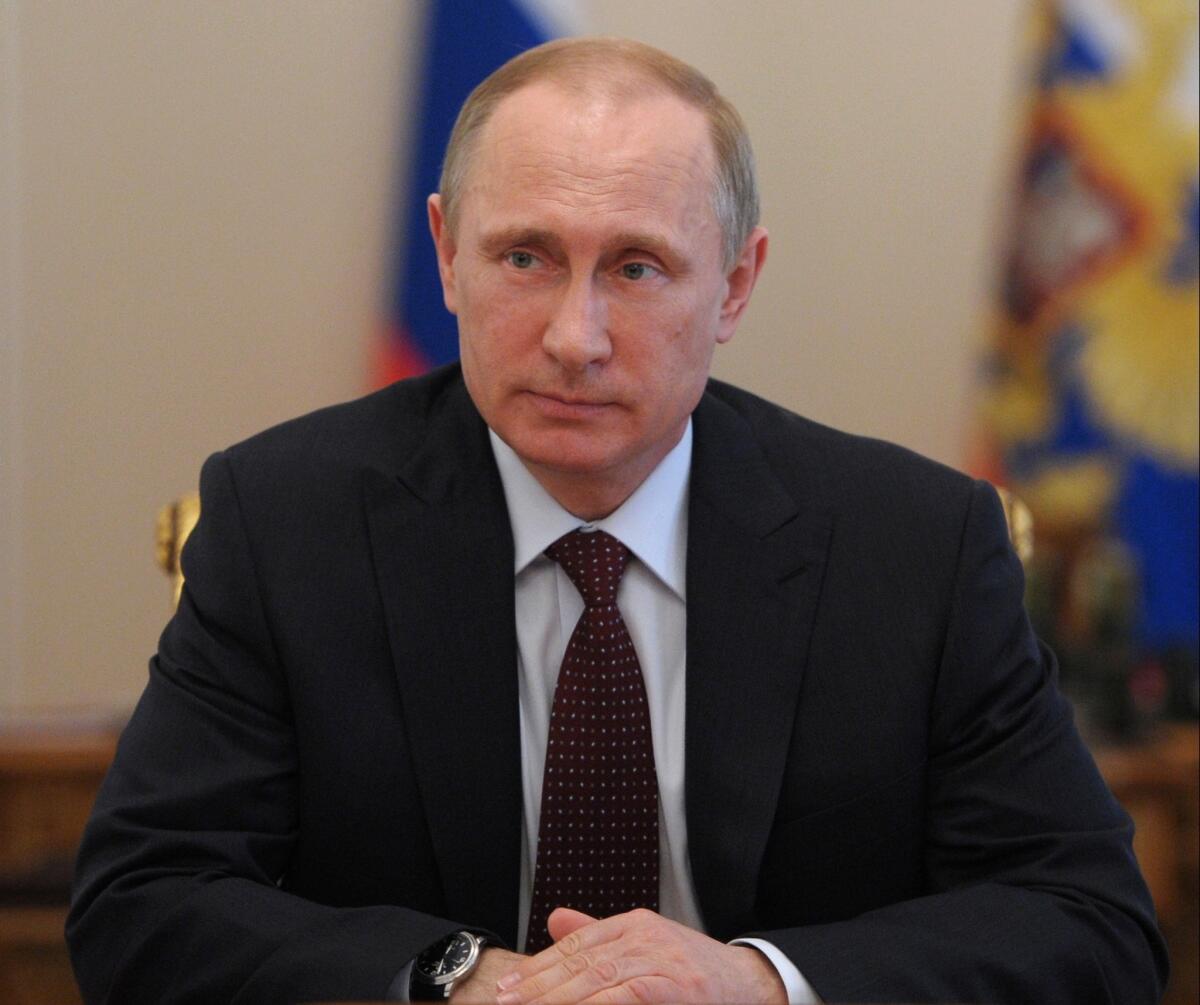Column: What Putin wants, and how he plans to get it

It was tempting to look at last week’s diplomatic agreement to pull Ukraine back from the brink of war and see the beginning of a grand compromise between Russia and the West.
Tempting, but mistaken.
Vladimir Putin is still winning most of what he wants in Ukraine, and he’s winning it more cheaply and more elegantly than he would by launching a full-scale military invasion.
Last week’s agreement, which called on pro-Russia militias to end their occupation of government buildings, was probably only a speed bump on the way toward bringing all of Ukraine under Moscow’s influence.
That’s not only the view of seasoned Russia watchers; it’s also the fear of many officials inside the Obama administration.
President Obama could use a diplomatic win, but there wasn’t a shred of triumphalism — or even optimism — in his description of last week’s accord. “I don’t think we can be sure of anything,” Obama told reporters. “There is the possibility, the prospect, that diplomacy may de-escalate the situation.... But I don’t think, given past performance, that we can count on that.”
Or even given present performance. While Russian Foreign Minister Sergei Lavrov was in Geneva drafting the joint agreement on Ukraine, Putin was speaking at a news conference in Moscow, and he wasn’t sounding like a man in the mood for concessions. “It’s New Russia,” he trumpeted. “Kharkiv, Lugansk, Donetsk, Odessa were not part of Ukraine in czarist times; they were transferred in 1920. Why? God knows.”
Actually, every Russian historian knows: Lenin drew those borders to make sure Ukraine’s population included plenty of reliable Russians.
Putin said reports that Russian troops were among the insurgents in those cities were “rubbish.” He called the Ukrainian government illegitimate. And he said he had a duty to protect the people of what he called “the Russian southeast.”
He added that the upper house of Russia’s parliament had already authorized him to use military force — although, he added generously, he hoped it wouldn’t come to that.
“He’s not compromising,” warned Fiona Hill, the Brookings Institution’s ace Putinologist. “He’s looking for what the market will bear. He’s trying to see how much of Ukraine he can take, and he’ll settle for what he can get.”
Does that mean additional military action? Not if Putin can get what he wants without it. In the short run, Hill and others say, Russia will continue to press for Ukrainian constitutional reforms that would give pro-Russia areas more autonomy and, if Moscow has its way, the right to secede. And Russia wants a delay in Ukraine’s presidential election scheduled for May 25, because the vote would make Kiev’s current provisional government much more legitimate in the eyes of the world.
“He may not need to invade to get what he wants,” Hill told me. “He knows that if he doesn’t take military action, we’ll all say, ‘Thank God.’”
In that sense, Secretary of State John F. Kerry was mistaken a few weeks ago when he denounced Putin for behaving like a 19th century autocrat. Instead, the Russian president is a product of the 20th century KGB, where his career began. He knows that subversion is much cheaper than invasion.
That may also be why Putin took a cautious step back from military action last week: The cost-benefit analysis was pretty clear.
In Russia, the 2-month-old crisis has already taken an economic toll: a 12% drop in the Moscow stock index since February and an estimated $51 billon in capital flight in the first quarter. Last week, Russia’s finance minister announced that he had trimmed his projection for this year’s economic growth from 2.5% to 0.5%.
The United States and the European Union have agreed that direct Russian military action would force them to respond with new economic sanctions, but without military action, that consensus fell apart. Putin “thinks the EU will back off, and he’s probably right,” Hill said.
And one more factor, Hill noted: “The prospect of Ukrainians and Russians fighting each other didn’t make Russians very happy. A war could have played very badly at home.”
The best form of victory for Putin would be to have his cake and eat it too: to have a Ukraine that gives Moscow a veto over its foreign policy and keeps its economy tied to the east, without all the costs of a full-scale invasion.
He’s on track toward that goal. The United States and its European allies can still push back through long and patient support for the government in Kiev and a costly effort to rescue Ukraine’s staggering economy. But it’s an asymmetrical contest. Putin’s interest in Ukraine is immediate and visceral; the outcome is central to his agenda as president. For Obama and other Western leaders, Ukraine is important but peripheral.
“There is a battle for Ukraine, but it’s not going to be on a military battlefield,” Hill told me. “It’s going to be a game of wits. The question is: Can we outsmart Putin?”
And, even more difficult, outsmart him on his own turf?
Twitter: @DoyleMcManus
More to Read
Sign up for Essential California
The most important California stories and recommendations in your inbox every morning.
You may occasionally receive promotional content from the Los Angeles Times.










